Organic, Synthetic and Biomass Fuel Additives
Types of fuel additives in the market
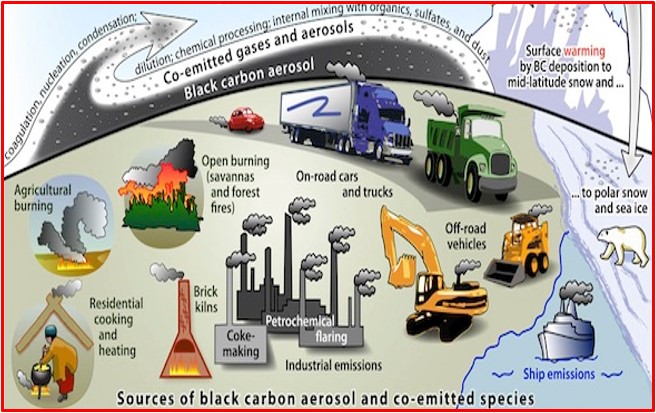
There are several types of fuel additives, including fuel performance enhancers and fuel stabilizers. Fuel performance enhancers are intended to improve the performance of the fuel, such as by increasing the octane rating or reducing engine deposits. Fuel stabilizers, on the other hand, prevent the fuel from deteriorating over time and help to maintain its quality. Other types of fuel additives include deposit control additives, fuel-line antifreeze, lubricity additives, friction modifiers, and more.
Therefore, it’s important to specify which type of fuel additive you’re interested in knowing more about.
Different types of fuel additives include:
- Fuel performance enhancers, which are intended to improve the performance of the fuel, such as by increasing the octane rating or reducing engine deposits.
- Fuel stabilizers, which prevent the fuel from deteriorating over time and help to maintain its quality.
- Deposit control additives, designed to reduce the amount of debris and buildup that accumulates in the engine over time.
- Fuel-line antifreeze, which keeps the fuel from freezing in cold temperatures.
- Lubricity additives, which serve to reduce friction and wear within the engine.
- Friction modifiers, which aim to reduce the amount of friction on engine components, ultimately improving fuel efficiency.
- Corrosion inhibitors, which prevent the fuel and engine components from rusting or corroding.
- Anti-gel agents, are used in colder climates to restrict the solidification or thickening of diesel fuels.
These are just a few examples of the different types of fuel additives available in the market, each with their specific roles and benefits.
But, generally its divided into three categories,
- Synthetic or chemical mixed
- Biomass or bio-Based (100% from plants)
- 100% Organic and silicon based
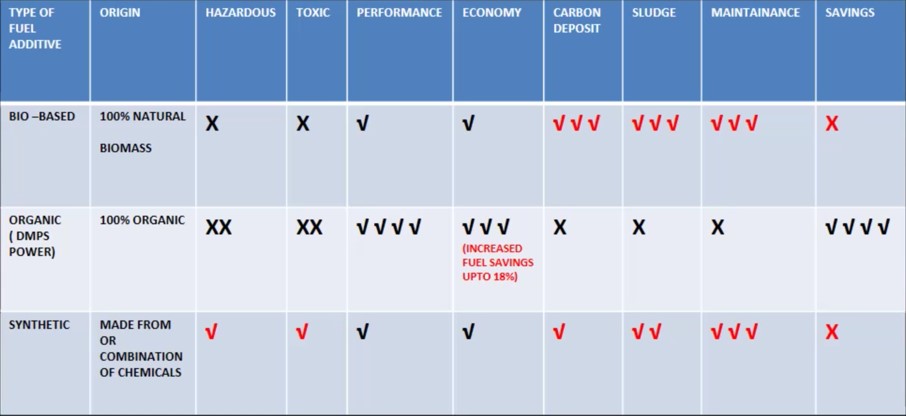
Synthetic or chemical fuel additive
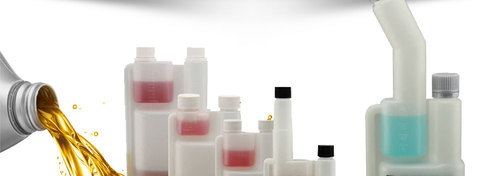
Distinguishing Features
- Made from or mixed with chemicals, i.e. different chemical for different specific function, e.g. Acetone or Camphor (for power) and solvents (for cleaning or detergent)
- Perform specific functions separately, i.e. separate function of power boost, fuel economy and fuel detergent with no synergy effect, when added to fuels
Distinguishing Side Effects
- Power boosters are insoluble and separated from fuel over time to form gum DEPOSITS that are harmful to injectors
- Detergents de-lubricate, thus increasing FRICTION and HEAT that causes higher valve and piston wear
- Higher friction increases engine TEMPERATURE and KNOCK
Comparing Features and Characteristics
- Chemical based or added
- No fuel quality enhancement ability
- Does not blend with fuel molecule, i.e. remains as different entity
- Does not have Oxygen increment ability
- Does not provide natural lubricity to fuel, i.e. chemical solvents added
- Harmful to engine as it’s chemical-based product
- Toxic (chemical-based)
- Hazardous (chemical-based)
- Flammable (usually combustible with low flash point)
- Dangerous for Inhalation or skin contact (chemical-based)
- Harmful to the environment
Biomass or bio-based fuel additive
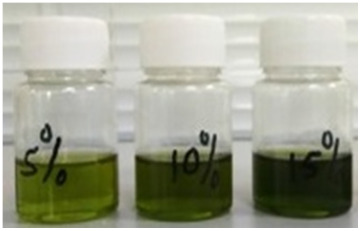
Distinguishing Features
- 100% natural
- It works by enhancing the quality of fuel in order to improve the combustion efficiency
- Performs multiple functions. All in one performance, i.e. lubricating agent, fuel economy, and lower emissions
Distinguishing Side Effects
- Cracks, reforms and combines with Hydrocarbon chains to create enhanced fuel molecules that do not separate
- Creates SLUDGE as the byproduct of combustion
- Being bio in nature increased CARBON residue in the engine
- Reduced engine life and higher MAINTENANCE
Comparing Features and Characteristics
- 100% natural
- It has Femto-molecules fuel cracking ability as well as fuel quality enhancement ability
- Blends with fuel molecules
- Environmental-friendly, bio-degradable and renewable source
- Non-Dangerous i.e. safe for inhalation or skin contact, 100% vegetable oil
- Non-Flammable, zero Octane with high flash point (250°C)
- Non-Hazardous, 100% vegetable oil
- Non-Toxic, 100% vegetable oil
Organic fuel additive
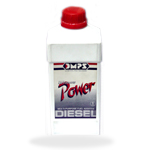
Distinguishing Features
- 100% organic & silicon based
- It works by enhancing the quality of fuel in order to improve the combustion efficiency
- Performs multiple functions. All in one performance i.e. power booster, fuel detergent, lubricating agent, fuel economy, and lower emissions
Distinguishing Side Effects
- Increased fuel SAVINGS upto 18%
- Reduce SLUDGE formation by 19%
- Being ORGANIC in nature, no CARBON residue, instead it helps convert CO and HC to CO2 and H2O
- Reduce maintenance
- Clean CARBON deposits naturally with natural lubricating properties, thereby reducing piston and valve wear. Cleaner internal engine parts restores power over time
- Lower FRICTION reduces engine heat and knock
Comparing Features and Characteristics
- 100% organic and silicon based
- Blends with fuel molecules
- Increases Oxygen
- No harmful side effects to engine, instead protects against wear and tear
- Provides natural lubricity to fuel
- Environmental-friendly
- Non-Dangerous i.e. safe for inhalation or skin contact, 100% organic
- Non-Flammable, zero Octane with high flash point (1415°C)
- Non-Hazardous, 100% organic
- Non-Toxic, 100% organic
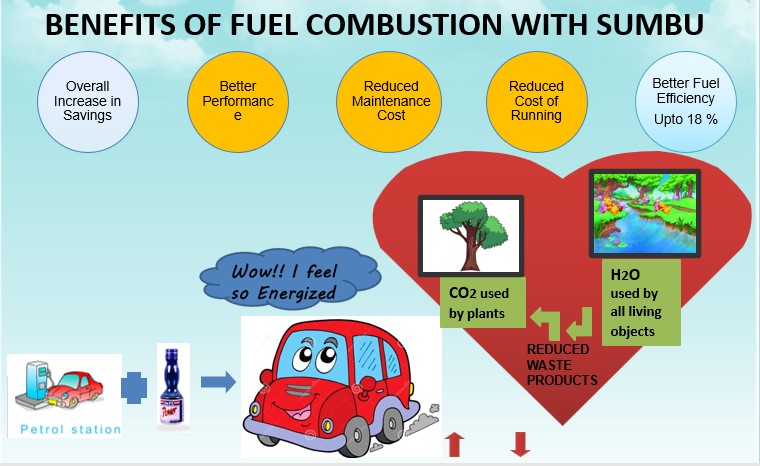
Contact us
email : sales [at] cemax [dot] com [dot] my whatsapp : +60 16 207 5400




Leave a Reply